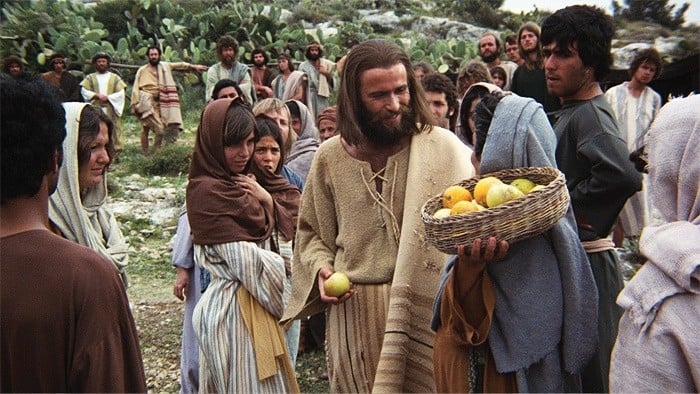Jesus rejected cultural norms to embrace people society had pushed to the margins. Among those people were the poor. The Bible is packed with verses expounding on God’s heart for the poor. Here are five times Jesus showed he cares for the impoverished:
1. The sheep and the goats
In one provocative parable, Jesus says that when he comes in all his glory and sits on his throne before all the nations, “he will separate the people one from another as the shepherd separates the sheep from the goats” (Matthew 25:32 NIV). The sheep are honored for caring for Jesus in his time of need.
Confused, they ask Jesus when they cared for him. His response is a powerful picture of Jesus’ profound concern for the poor:
“‘Truly I tell you, whatever you did for one of the least of these brothers of mine, you did for me’” (Matthew 25:40 NIV).
As recipients of his judgment, the goats are equally confused-when did they see the Lord and not care for him?
“Truly I tell you, whatever you did not do for one of the least of these, you did not do for me” (Matthew 25:45 NIV).
Jesus equated serving or neglecting the poor with serving or neglecting God.
Video: Jesus is the good shepherd
2. Jesus preached the good news to the poor
When John the Baptist was imprisoned, he sent a message to Jesus: “Are you the Messiah, or should we be expecting someone else?” (Matthew 11:2-3).
Instead of giving him a direct answer, Jesus points to the messianic signs and wonders he has performed:
“Go back and report to John what you hear and see: The blind receive sight, the lame walk, those who have leprosy are cleansed, the deaf hear, the dead are raised, and the good news is proclaimed to the poor. Blessed is anyone who does not stumble on account of me.” (Matthew 11:4-6).
Redemption for the poor was part of God’s plan for restoration through the Messiah.
3. The bleeding woman
In Luke 8, Jesus shows compassion to a woman who’s been impoverished by illness. She’s spent all she had on doctors who couldn’t heal her (Luke 8:43). Her disease had robbed her of her livelihood and ruined her reputation. Out of desperation, she touched Jesus’ cloak, and he healed her. After she’s healed, Jesus stops what he’s doing and draws attention to her, giving her the opportunity to share her miraculous healing with the crowd (Luke 8:47).
Jesus went beyond healing her of her physical afflictions; he gave this poor woman a platform to restore her reputation, too. Her material poverty was paired with an emotional and spiritual poverty from being labeled unclean for so long. Jesus healed her of that as well.
Jesus’ concern for the poor goes beyond their physical needs.
4. Parable of the Great Banquet
While having dinner at a prominent Pharisee’s house, Jesus tells the host that when they have banquets, they should invite the poor-people who are incapable of returning the favor with an invitation to a banquet of their own (Luke 14:12-14). Then, he shares the Parable of the Great Banquet:
“A certain man was preparing a great banquet and invited many guests. At the time of the banquet he sent his servant to tell those who had been invited, ‘Come, for everything is now ready.’
“But they all alike began to make excuses. The first said, ‘I have just bought a field, and I must go and see it. Please excuse me.’
“Another said, ‘I have just bought five yoke of oxen, and I’m on my way to try them out. Please excuse me.’
“Still another said, ‘I just got married, so I can’t come.’
“The servant came back and reported this to his master. Then the owner of the house became angry and ordered his servant, ‘Go out quickly into the streets and alleys of the town and bring in the poor, the crippled, the blind and the lame.’
“‘Sir,’ the servant said, ‘what you ordered has been done, but there is still room.’
“Then the master told his servant, ‘Go out to the roads and country lanes and compel them to come in, so that my house will be full. I tell you, not one of those who were invited will get a taste of my banquet.’” -Luke 14:16-24
Jesus says the poor-and other social outcasts-are invited to the kingdom of God.
5. Blessed are you who are poor
In Luke 6, Jesus says, “Blessed are you who are poor, for yours is the Kingdom of God.” He promises that the poor will inherit something far greater than any of the riches of this world. He goes on to say that those who suffer now will not suffer in the kingdom (Luke 6:21-22).
This is a message that Jesus communicates again in his parable about Lazarus and the Rich Man (Luke 16:19-31). In this parable he tells the story about a rich man who passes by a poor, diseased man at the city gates. When the two of them die, Lazarus finds himself tormented while the beggar is by Abraham’s side. The rich man begs Abraham for mercy, and Abraham responds:
“Son, remember that in your lifetime you received your good things, while Lazarus received bad things, but now he is comforted here and you are in agony.” (Luke 16:25, NIV)
Jesus indicates that the values of the world will be turned upside down in his kingdom.
Show people what Jesus said about the poor
Jesus had a lot to say about how we treat people living in poverty, and what God thinks of the poor. Share this post with your church or your small group to start a conversation about how Christians today can follow Jesus’ example.
